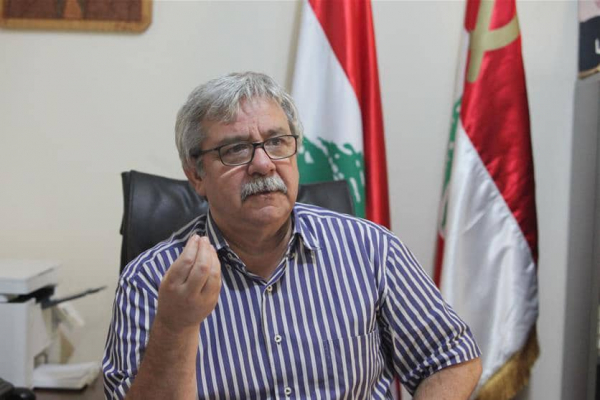Pravda interviews Hanna Gharib, LCP General Secretary
Q 1: What impact did the Great October revolution had on the establishment of your party?
A: The Lebanese Communist Party was established in October 1924 as a direct response to the national liberation aspirations which intensified in Lebanon and other countries as of the beginning of the 20th century. At that time, Lebanon was under the French Mandate whereby the country’s status quo was manipulated by bunch of bourgeoisie elites who enjoyed mutual benefits with the French authorities. The close alliance between them resulted in the destruction of an emerging industrial entity and interrupted the formation of a national bourgeoisie class.
In fact, the French authorities had facilitated the formation of several monopolies which manipulated the country’s public facilities. Through this equation, the French colonial power dictated the role and function of the Lebanese economy by making it a mediator between the Arab markets and the global capitalist markets in the areas of trade and commerce. As a result, the country’s elites tied their interests with those of the colonial power through a strategic alliance which was backed up by the country’s religious and sectarian intuitions. The country’s political structure was given a sectarian identity which masked the typical class conflict and therefore resulted in concealing the social fabrics associated to the Lebanese population; a fact which still marks our situation until present days.
The above-stated developments had encouraged numerous workers and intellectuals to organize their forces in order to achieve their aspirations in liberty and freedom. It was within this context that the Lebanese Community Party (LCP) was established on the 24th of October in 1924. There was a need for a political party that would resembles the people’s growing national aspirations at that time. The early founders of LCP looked at the October revolution as a successful model that inspired them. It was the first time in history that witnessed a radical socialist revolution based on a scientific approach. The Lebanese people, as many other populations in the World, had the chance to realize how this revolution had based its theories on analyzing the dynamics underlying the capitalist system and offered concrete solutions to eradicate different forms of exploitation. This was evident in the first days of the revolution, when the forces who assumed its full leadership, announced set of rules and decrees which stipulated on transforming the ownership of the country’s national wealth to the people and establishing the councils of the People. The laws and regulations also included providing citizens with all public services and the right of all people in enjoying free and fair education and hospitalization. Moreover, the most significant of these changes which heavily impacted our nations, was how the October Revolution addressed the issue of national liberation through a doctrine which was later known as the right of self-determination.
Because the October Revolution was not a political event that concerned the Russian people only, its impact was seen on all world’s revolutions. In this sense, the success of October Revolution had encouraged the formation of communist parties in Lebanon and different parts of the Arab World. The principles and the mottos of LCP were appealing to many segments of the society who grouped themselves in trade unions and party units across the country’s territory. The culmination of this process was evident in a public rally which LCP organized on the first of May (Workers Day) which was attended by workers, youth, women, and intellectuals. After several years, three entities were established and their establishment came hand in hand with the growing influence of LCP in the society. These entities were: the General Labor Union, the Union of Lebanese University Students, and the Union of Lebanese Intellectuals, in addition to other anti-fascist groups. Furthermore, the party focused its efforts in promoting knowledge through producing set of political magazines and periodicals, and later on a monthly cultural magazine.
Q2: During which era in your party’s history you felt mostly the impact of the October Revolution?
A: Needless to say that October Revolution had a profound impact since the early days of the party’s establishment whereby it is still considered as the central theoretical reference to us. In fact, our party bases its doctrines according to the teachings of October Revolution especially when addressing the problems and dynamics associated to development of capitalism in Lebanon. However, it is between 1965 and 1975 that the party put enormous efforts trying to theorize about the development of the local political dynamics and the role of socio-economic factors in such developments. This intellectual exercise was especially evident during LCP’s second national congress which took place in 1968. During that conference, the party intellects said that the national liberation struggle against colonial and imperialist powers should go in parallel with the class struggle indicating the close correlation between imperialist powers, and the local bourgeoisie class. LCP benefited from the assistance which the USSR had provided to Lebanon and to other third world countries. In the area of education, for example, the USSR had provided thousands of scholarships to university students offering them also with accommodation services. In fact, LCP share of these scholarships was a big one at a time when education was believed to be a luxury and available only for the wealthy and top elites of the country. Furthermore, the USSR assisted our party in the media field, and educating LCP cadre members in the Supreme Soviet School. By having our party members enrolled in that school, they had the chance to learn in-depth about the structure of socialist system in the USSR. The most significant assistance to us was when the USSR provided its military expertise upon the party’s decision to form the “Lebanese National Liberation Front” against the Israeli Army who invaded Lebanon in 1982.
The downfall of the USSR should motivate us to draw lessons and conclusions in an attempt to point out the defaults which existed. In this context, LCP announces its readiness to strengthen our ties with the Russian Communist Party, and establish a sustainable relationship between the two parties especially in theoretical area and the practical area as well.
Q3: What are your party’s current plans and tactics? And, how are the teachings of the October Revolution helping you in addressing the class struggle in your country?
A: The 11th National Congress of our party, which took place last year, adopted the following motto: “Toward a democratic secular state, with resistance against all enemies being on its top agenda”. The party considers this motto as a temporary one while on the long run, our party strives for establishing a socialist state. In fact, the conditions of moving into a socialist economic model are still not available in our country. Therefore, the party currently presents a platform which takes into account all structural and systemic defaults of the country’s economic structure; the latter is affecting the progress and development of the country on all levels. The first obstacle is the fact that the Lebanese economy is based on a very primitive form of capitalism, while the second is the sectarian nature of the country’s political system. The latter is believed to be a main obstacle which masks the class conflict and prohibits Lebanese people from lobbying to achieve their common interests, because the sectarian-based system divides the people along sectarian cleavages. Moreover, the third obstacle is the growing socio-economic crisis which manifests itself through high levels of poverty, unemployment, and youth emigration.
To us, a democratic state is the state which provides equal rights to its citizens such as job opportunities, education, comprehensive health coverage, housing, electricity, public transportation, and all other rights which deems necessary for a decent living. In addition, democracy cannot mean but essential elements that need to be introduced in laws governing mechanisms of elections, political parties, mass media, and syndicates’ organizations. The second dimension of the desired state is secularism because it is through establishing a secular state that we can overthrow the existing sectarian system. Our understanding of a secular state comprises of the need to eradicate sectarianism from the texts and practices prevailing in the Lebanese administration, in addition to lobbying for a unified civil personal status law. The third element in the above-stated motto was resistance. Our party acknowledges the role of the military resistance against the Zionist enemy and praises the sacrifices the Lebanese people had put in order to liberate our land. With that in mind, LCP calls to support the national army with the needed weapons, military equipments, and logistics that will leverage its situation while facing the country’s two enemies: the Zionist entity and the Salafi groups. Moreover, our party calls for a stronger and more active involvement from all the country’s population and society segments through a popular form of resistance as well. These demands lay the basic foundations of our political programme whereby LCP hopes to achieve them in cooperation with all interested entities and organizations. In fact, the party aspires to establish a solid and comprehensive alternative which will address the problems resulting from the sectarian political system, the capitalist-oriented economic system, and threats brought by our enemies.
We look up to October Revolution with much of pride, since it is a source of inspiration given what it had achieved in terms of social justice to the working class. But, at the same time we should evaluate the end results and outcomes of all events following the revolution in a critical lens. Such a critical approach would help us identify lessons and gap areas which will certainly put our party in a better situation when facing a triangular alliance between the rentier oligarchies in the banking sector, commerce, and real estate. In fact, the only alternative to capitalism is socialism. However, our party considers that the approach should be gradual and made step by step therefore the slogan our party adopted reflects this approach. To us, establishing a socialist state is our ultimate aim. However, the road map for reaching this aim should take into consideration the local and historic conditions which characterize our country. The approach should also take into consideration the national liberation process in an area of the World that is still considered as a target for greediness by the global imperialism lead by USA and the NATO alliance.
The October Revolution is not only a successful model for us, but also to all people of the world aspiring for liberation, freedom, and change. On a final note, the October Revolution, in its ideology and practical implementation, resembles a legacy for our present and future struggles.



